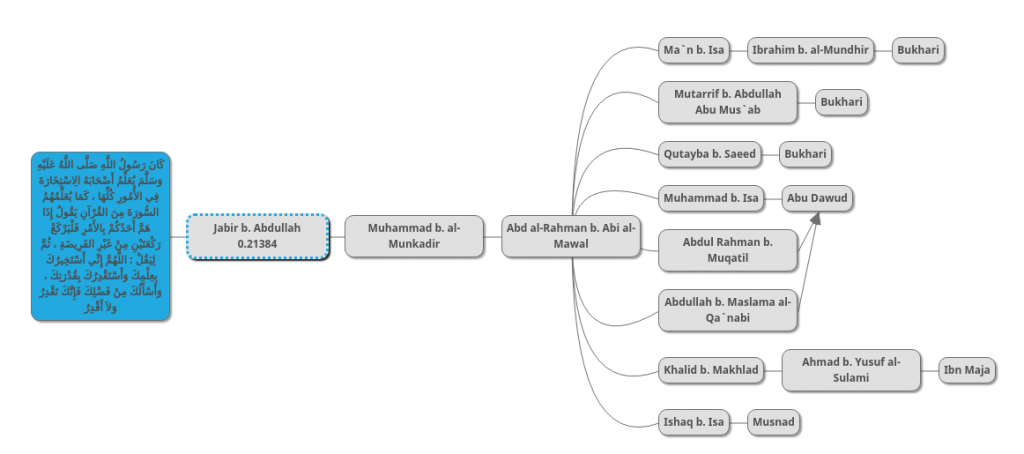A famous hadith of the Prophet  teaches us about the istikhāra prayer, which is a prayer performed to request for God’s guidance in an important matter that a person is uncertain about. What is surprising is that this hadith comes to us from a rather low-quality chain of transmitters:
teaches us about the istikhāra prayer, which is a prayer performed to request for God’s guidance in an important matter that a person is uncertain about. What is surprising is that this hadith comes to us from a rather low-quality chain of transmitters:
Narrated Jabir bin `Abdullah:
Jabir (May Allah be pleased with him) reported:
Sahih al-Bukhari 1166
Messenger of Allah (ﷺ) used to teach us the Istikharah (seeking guidance from Allah) in all matters as he would teach us a Surah of the Qur'an. He used to say: "When one of you contemplates entering upon an enterprise, let him perform two Rak'ah of optional prayer other than Fard prayers and then supplicate: "Allahumma inni astakhiruka bi 'ilmika, wa astaqdiruka bi qudratika, wa as-'aluka min fadlikal-'azim. Fainnaka taqdiru wa la aqdiru, wa ta'lamu wa la a'lamu, wa Anta 'allamul- ghuyub. Allahumma in kunta ta'lamu anna hadhal-'amra (and name what you want to do) khairun li fi dini wa ma'ashi wa 'aqibati amri, (or he said) 'ajili amri ajilihi, faqdurhu li wa yassirhu li, thumma barik li fihi. Wa in kunta ta'lamu anna hadhal 'amra (and name what you want to do) sharrun li fi dini wa ma'ashi wa 'aqibati amri, (or he said) wa 'ajili amri wa ajilihi, fasrifhu 'anni, wasrifni 'anhu, waqdur liyal- khaira haithu kana, thumma ardini bihi." (O Allah, I consult You through Your Knowledge, and I seek strength through Your Power, and ask of Your Great Bounty; for You are Capable whereas I am not and, You know and I do not, and You are the Knower of hidden things. O Allah, if You know that this matter (and name it) is good for me in respect of my Deen, my livelihood and the consequences of my affairs, (or he said), the sooner or the later of my affairs then ordain it for me, make it easy for me, and bless it for me. But if You know this matter (and name it) to be bad for my Deen, my livelihood or the consequences of my affairs, (or he said) the sooner or the later of my affairs then turn it away from me, and turn me away from it, and grant me power to do good whatever it may be, and cause me to be contented with it). And let the supplicant specify the object."
This hadith is the strongest existing hadith that mentions istikhāra. There are a few other hadiths but they are either weak or so low-quality as not to be worth considering. Below is a diagram of most existing chains of transmitters for this hadith:

I used probabilistic hadith criticism to judge the strength of this chain, and the result is that this hadith gets a score of 21.3% probability of authenticity, which is below the 30% needed for a hadith to be judged ṣaḥīḥ (authentic).
The instincts of hadith scholars are seldom wrong, and this hadith raised red flags among them due to coming to us through a single transmitter (ʿAbd al-Raḥmān b. Abī al-Mawālī), who is the person in the above diagram from whom all the chains branch out. Al-Tirmidhī and al-Dāraquṭnī considered the hadith gharīb (strange/unusual), while Imam Aḥmad considered it munkar (unusual and basically not worth taking too seriously).
Based on these facts, we can determine that the istikhāra prayer is not a strongly-supported part of Islam, as I have always suspected.
Now, there is no issue with praying to God for guidance. But doing it in this ritualistic way, as if it is some sort of magic spell designed to bring out assured results, has never felt very “Islamic” to me and goes against my Quran-taught instincts. Ideally we should pray for guidance constantly, and any practicing Muslim will pray for guidance at least 17 times a day during the ṣalāh as they recite Surat al-Fātiḥa (“Guide us to the Straight Path” is in verse 6). But performing the istikhāra seems to be an unnecessary and possibly fabricated addition to Islam.
However, since the hadith has a score of 21.3%, it is still a ḥasan (possibly authentic) rather than a ḍaʿīf (weak/unsound) hadith. So there is no justification for criticizing people who perform this prayer.